
Political Ethics: A Handbook
What is the relationship between politics and morality? May politicians bend moral constraints in the name of political necessity? Is it always wrong for leaders to lie? How much political compromise is too much (or too little)? In Political Ethics, some of the world’s leading thinkers in politics, philosophy, and related fields offer a comprehensive and accessible introduction to key issues in this rapidly growing area of political theory.
In a series of original essays, the contributors examine a range of urgent political problems: lies and deception, compromise and refusal to compromise, the meaning and limits of political integrity, representation and failures of representation, good and bad democratic leadership, the virtues and excesses of partisanship, administrative ethics, political corruption, whistleblowing, legitimate and illegitimate claims of political emergency, and lobbying. What emerges are realistic but demanding ethical standards—and a clear-eyed understanding of the ethical challenges of political life in the twenty-first century.
With contributions by Richard Bellamy, Alin Fumurescu, Edward Hall, Suzanne Dovi and Jesse McCain, Eric Beerbohm, Russell Muirhead and Nancy Rosenblum, Joseph Heath, Elizabeth David-Barrett and Mark Philp, Michele Bocchiola and Emanuela Ceva, Nomi Lazar, Phil Parvin, and Andrew Sabl.
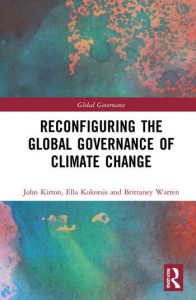
Reconfiguring the Global Governance of Climate Change
This book charts the course and causes of UN, G7 and G20 governance of climate change through the crucial period of 2015–2021. It provides a careful, comprehensive and reliable description of the individual and interactive contributions of the G7, G20 and UN summits and analyses their results.
The authors explain these contributions and results by considering the impacts of causal candidates, such as a changing physical ecosystem and international political system and the actions of individual leaders of the world’s most systemically significant countries. They apply and improve an established, compact causal model, grounded in international relations theory, to guide these tasks.
By developing, prescribing and implementing immediate, realistic actionable policy solutions to cope with the urgent, existential challenge of controlling climate change, this volume will appeal to scholars of international relations, global governance and global environmental governance.
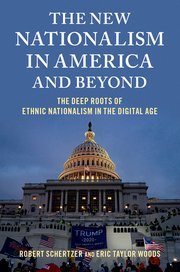
The New Nationalism in America and Beyond: The Deep Roots of Ethnic Nationalism in the Digital Age
A careful analysis of the social media campaigns of Donald Trump, Marine Le Pen, and the Brexit campaigners, which shows how today’s new nationalists are cultivating support from white majorities by tapping into their history and culture.
Across the West, there has been a resurgence of ethnic nationalism, populism, and anti-immigrant sentiment – a phenomenon that many commentators have called the “new nationalism.” In The New Nationalism in America and Beyond, Robert Schertzer and Eric Taylor Woods seek to understand why the bastions of liberalism are proving to be fertile ground for a decidedly illiberal ideology. To do so, they examine the social media campaigns of three of the most successful exemplars of the new nationalism: Donald Trump in the US, Marine Le Pen in France, and Brexit in the UK. Schertzer and Woods show how today’s new nationalists are cultivating support from white majorities by drawing from long-standing myths and symbols to construct an image of the nation as an ethnic community. Their cutting-edge and multidisciplinary approach combines elements of political science, sociology, history, and communication and media studies, to show how leaders today are updating the historical foundations of ethnic nationalism for the digital age.

Revolution and Dictatorship: The Violent Origins of Durable Authoritarianism
Revolution and Dictatorship explores why dictatorships born of social revolution—such as those in China, Cuba, Iran, the Soviet Union, and Vietnam—are extraordinarily durable, even in the face of economic crisis, large-scale policy failure, mass discontent, and intense external pressure. Few other modern autocracies have survived in the face of such extreme challenges. Drawing on comparative historical analysis, Steven Levitsky and Lucan Way argue that radical efforts to transform the social and geopolitical order trigger intense counterrevolutionary conflict, which initially threatens regime survival, but ultimately fosters the unity and state-building that supports authoritarianism.
Although most revolutionary governments begin weak, they challenge powerful domestic and foreign actors, often bringing about civil or external wars. These counterrevolutionary wars pose a threat that can destroy new regimes, as in the cases of Afghanistan and Cambodia. Among regimes that survive, however, prolonged conflicts give rise to a cohesive ruling elite and a powerful and loyal coercive apparatus. This leads to the downfall of rival organizations and alternative centers of power, such as armies, churches, monarchies, and landowners, and helps to inoculate revolutionary regimes against elite defection, military coups, and mass protest—three principal sources of authoritarian breakdown.
Looking at a range of revolutionary and nonrevolutionary regimes from across the globe, Revolution and Dictatorship shows why governments that emerge from violent conflict endure.
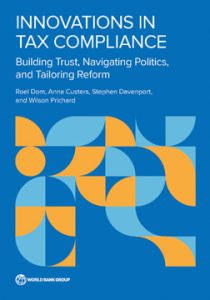
Innovations in Tax Compliance : Building Trust, Navigating Politics, and Tailoring Reform
Recent decades have seen important progress in strengthening country tax systems. Yet many areas of reform have remained stubbornly resistant to major improvements. Overall, revenue collection still falls short of that needed for effective governance and service delivery. Tax collection is too often riddled with high rates of evasion among large corporations and the rich and by disproportionate, though often hidden, burdens on lower-income groups. As countries around the world deal with the large debt burdens induced by COVID-19, an in-depth look at how to strengthen tax systems is especially timely. Innovations in Tax Compliance: Building Trust, Navigating Politics, and Tailoring Reform takes a fresh look at tax reform. The authors draw on recent research and experience for their new conceptual framework to guide more effective approaches to reform. Building on the achievements of recent decades, they argue for a greater emphasis on the overlapping goals of building trust, navigating political resistance, and tailoring reform to unique local contexts—an emphasis achieved by identifying the most binding constraints on reform. This focus not only can lead to greater compliance, a fairer system, and higher revenues, but also can contribute to building state capacity, sustained political support for further reforms, and a stronger fiscal contract between citizens and governments.
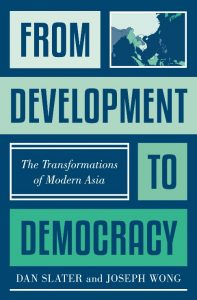
From Development to Democracy: The Transformations of Modern Asia
Over the past century, Asia has been transformed by rapid economic growth, industrialization, and urbanization—a spectacular record of development that has turned one of the world’s poorest regions into one of its richest. Yet Asia’s record of democratization has been much more uneven, despite the global correlation between development and democracy. Why have some Asian countries become more democratic as they have grown richer, while others—most notably China—haven’t? In From Development to Democracy, Dan Slater and Joseph Wong offer a sweeping and original answer to this crucial question.
Slater and Wong demonstrate that Asia defies the conventional expectation that authoritarian regimes concede democratization only as a last resort, during times of weakness. Instead, Asian dictators have pursued democratic reforms as a proactive strategy to revitalize their power from a position of strength. Of central importance is whether authoritarians are confident of victory and stability. In Japan, South Korea, and Taiwan these factors fostered democracy through strength, while democratic experiments in Indonesia, Thailand, and Myanmar were less successful and more reversible. At the same time, resistance to democratic reforms has proven intractable in Singapore, Malaysia, Hong Kong, China, Vietnam, and Cambodia. Reconsidering China’s 1989 crackdown, Slater and Wong argue that it was the action of a regime too weak to concede, not too strong to fail, and they explain why China can allow democracy without inviting instability.
The result is a comprehensive regional history that offers important new insights about when and how democratic transitions happen—and what the future of Asia might be.

Multiple Barriers: The Multilevel Governance of Homelessness in Canada
Despite decades of efforts to combat homelessness, many people continue to experience it in Canada’s major cities. There are a number of barriers that prevent effective responses to homelessness, including a lack of agreement on the fundamental question: what is homelessness?
In Multiple Barriers, Alison Smith explores the forces that shape intergovernmental and multilevel governance dynamics to help better understand why, despite the best efforts of community and advocacy groups, homelessness remains as persistent as ever. Drawing on nearly 100 interviews with key actors in Vancouver, Calgary, Toronto, and Montreal, as well as extensive participant observation, Smith argues that institutional differences across cities interact with ideas regarding homelessness to contribute to very different models of governance. Multiple Barriers shows that the genuine involvement of locally based service providers, with the development of policy, are necessary for an effective, equitable, and enduring solution to the homelessness crisis in Canada.
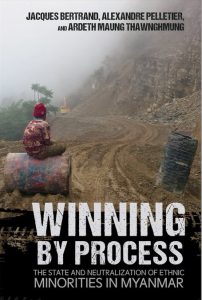
Winning by Process: The State and Neutralization of Ethnic Minorities in Myanmar
Winning by Process asks why the peace process stalled in the decade from 2011 to 2021 despite a liberalizing regime, a national ceasefire agreement, and a multilateral peace dialogue between the state and ethnic minorities.
Winning by Process argues that stalled conflicts are more than pauses or stalemates. “Winning by process,” as opposed to winning by war or agreement, represents the state’s ability to gain advantage by manipulating the rules of negotiation, bargaining process, and sites of power and resources. In Myanmar, five such strategies allowed the state to gain through process: locking in, sequencing, layering, outflanking, and outgunning. The Myanmar case shows how process can shift the balance of power in negotiations intended to bring an end to civil war. During the last decade, the Myanmar state and military controlled the process, neutralized ethnic minority groups, and continued to impose their vision of a centralized state even as they appeared to support federalism.

Populist Moments and Extractivist States in Venezuela and Ecuador: The People’s Oil?
This book addresses the intersection of extractivism, populism, and accountability. Although populist politics are often portrayed as a driver of poor environmental governance, Populist Moments and Extractivist States identifies it as an intervening variable at best – one that emerges in response to the accountability deficits of extractive states. Case studies in Venezuela – for many, the prototypical petrostate – and Ecuador – which exchanged agribusiness dependency for oil decades later – illustrate how extractive states are oriented by a colonial logic of export and service. This logic regulates state-society-nature relationships and circumscribes avenues for local stakeholders to hold public officials and extractive industries to account for environmental and human harms. Populist moments of the early 21st century across Latin America responded to these conditions, promising more equitable and sustainable futures. However, rather than reversing the technocracy, verticalism, and exclusion of the recent past, populist moments often intensified and legitimated them in the drive to maximize and distribute resource rents. The result has been cyclical, as populist moments of hope and rupture fall prey to the extractivist states they tried, and failed, to replace.
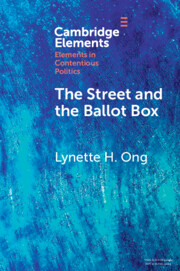
The Street and the Ballot Box: Interactions Between Social Movements and Electoral Politics in Authoritarian Contexts
How do discontented masses and opposition elites work together to engineer a change in electoral authoritarian regimes? Social movements and elections are often seen as operating in different terrains – outside and inside institutions, respectively. In this Element, I develop a theory to describe how a broad-based social movement that champions a grievance shared by a wide segment of the population can build alliances across society and opposition elites that, despite the rules of the game rigged against them, vote the incumbents out of power. The broad-based nature of the movement also contributes to the cohesion of the opposition alliance, and elite defection, which are often crucial for regime change. This Element examines the 2018 Malaysian election and a range of cases from other authoritarian regimes across Asia, Eastern Europe, and Africa to illustrate these arguments.